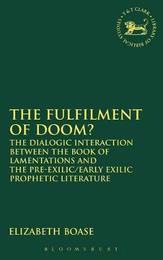
|
The Fulfilment of Doom?: The Dialogic Interaction between the Book of Lamentations and the Pre-Exilic/Early Exilic Prophetic Lit
Hardback
Main Details
| Title |
The Fulfilment of Doom?: The Dialogic Interaction between the Book of Lamentations and the Pre-Exilic/Early Exilic Prophetic Lit
|
| Authors and Contributors |
By (author) Elizabeth Boase
|
| Series | The Library of Hebrew Bible/Old Testament Studies |
|---|
| Physical Properties |
|
| ISBN/Barcode |
9780567026729
|
| Classifications | Dewey:224.3066 |
|---|
| Audience | | Postgraduate, Research & Scholarly | | Professional & Vocational | |
|---|
|
Publishing Details |
| Publisher |
Bloomsbury Publishing PLC
|
| Imprint |
T.& T.Clark Ltd
|
| Publication Date |
15 August 2006 |
| Publication Country |
United Kingdom
|
Description
It has long been noted that the book of Lamentations shares, at least in part, a theological outlook with the prophetic literature that the destruction of Jerusalem was the result of Yahweh's decisive action against the sins of the nation. Too often, however, this relationship has simply been presupposed, or assumed to be a relationship of shared perspective. To date, there has been no systematic exploration of how it is that Lamentations accepts and/or modifies the theological outlook of the prophetic literature. In addition, when the theology of the prophets has been discussed in relation to Lamentations, there has been a tendency to group all the prophetic books together as if they existed as a homogeneous whole, and shared amongst themselves a singular outlook. This tendency to simplify the theological complexity of the prophetic literature coincides with a similar tendency to reduce the theology of Lamentations to simple, monotheistic assertions. Drawing on the literary insights of Mikhail Bakhtin, this study aims to explore in detail the nature of the relationship between Lamentations and the pre-exilic/exilic prophetic literature. Drawing on the notions of dialogism, polyphony and double-voicing, the study argues that Lamentations enters into a dialogic relationship with prophetic literature, a relationship that both affirms and subverts that literature. Central to the acknowledgement of the dialogic interaction between Lamentations and the prophetic literature is the recognition of Lamentations as a multivalent, polyphonic text in which unmerged viewpoints exist in a tension-filled relationship.
Author Biography
Elizabeth Boase is Lecturer in Hebrew Bible/Old Testament at University of Notre Dame Australia.
Reviews"Overall, Boase's study represents a starting point. It is helpful mostly in what it assumes but does not always consciously say, that the biblical texts, as products of their culture, share certain cultural meanings yet differ in their perspective and portrayal of those meanings." -Jeremiah Cataldo, Hebrew Studies, 2007 -- Jeremiah Cataldo Review by Tyler Mayfield, Claremont Graduate University in Religious Studies Review, April 07 "B. convincingly challenges the claim that a similarity of themes and motifs indicates identical theologies. Her intertextual analyses show how, in some places, Lamentations adopts the meaning of prophetic themes and motifs, but also questions those meanings-and even at times subverts them, as in the shift from condemnation and warning to compassion and sympathy. B.'s study opens Lamentations in new ways and in doing so has demonstrated the usefulness of new methodological approaches." -Dianne Bergant, C.S.A., Theological Studies, March 2009 "Boase's monograph... is awelcome addition to this growing list of resources available on Lamentations." -- Charles Miller, Review of Biblical Literature -- Charles Miller * Review of Biblical Literature *
|